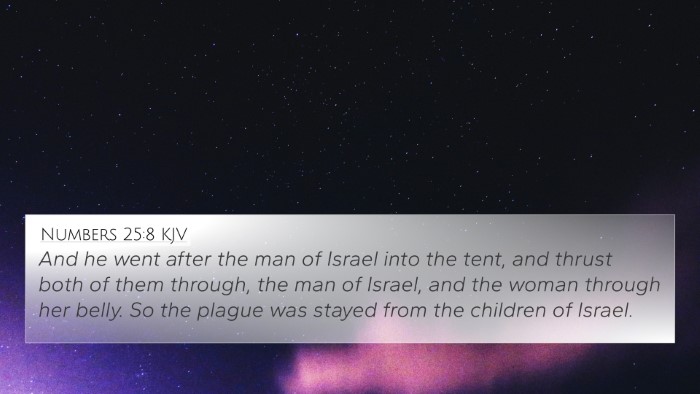Understanding Numbers 1:23
Numbers 1:23 reads: "Those who were numbered of the tribe of the children of Simeon were fifty and nine thousand and three hundred." This verse is part of a larger narrative detailing the census of the Israelites in the wilderness, highlighting the organization of the tribes as they prepared to enter the Promised Land. Through various commentaries, we can derive deeper meanings and connections from this text.
Context and Historical Significance
According to Matthew Henry, this enumeration serves multiple purposes: it demonstrates God's faithfulness in fulfilling His promise to the people of Israel, and it underscores the importance of numbers in establishing the identity and strength of each tribe. The tribe of Simeon, having a population of 59,300, indicates a relatively stable and strong community among the Israelites, which is significant for their future conquests.
Theological Insights
Albert Barnes emphasizes that Numbers 1:23 presents a clear picture of divine order and structure. The counting of the people was not merely for record-keeping; it was a reflection of God's sovereign plan for His people. Barnes notes that this attention to detail supports the notion that God's care extends even to the smallest aspects of His people's lives. Furthermore, the number signifies the cohesiveness and unity within the tribe, an important theme as they are about to embark on their journey to the Promised Land.
Interpretation of the Tribe of Simeon
Adam Clarke offers insight into the significance of Simeon. The tribe was one of the first born to Jacob, thus making their numbers pivotal in understanding the overall dynamics of the tribes. Clarke points out that Simeon, although smaller than some of the other tribes, held a distinct role in Israel's future. This could also be seen as reflective of themes of loyalty and service, which are prevalent throughout the biblical narrative.
Cross-References and Biblical Connections
Exploring Bible verse cross-references allows us to see how Numbers 1:23 connects with other scriptures. Here are some relevant references:
- Genesis 29:33: The birth of Simeon and the significance of his name, relating to God hearing Leah's affliction.
- Deuteronomy 33:6: A blessing for the tribe of Simeon, reinforcing its identity and purpose within Israel.
- Joshua 19:1-9: The allotment of land to the tribe of Simeon, illustrating their role in the eventual establishment of Israel.
- 1 Chronicles 4:24-27: A genealogy of the tribe, showcasing their lineage and contribution to Israel.
- Exodus 6:15: The listing of Simeon as one of the tribes of Israel during the Exodus.
- Numbers 2:12: Placement of the tribe of Simeon in the marching order of the Israelites.
- Luke 2:25-35: The story of Simeon in the New Testament highlights a connection between name and prophecy.
- Hebrews 7:14: Indicating that from Judah, the Lord arose, showing a shift in tribal significance.
- Matthew 10:4: Connection to Simeon through the list of the Twelve Apostles, emphasizing the continuity of God’s plan.
- Revelation 7:7: Mention of the tribe of Simeon in a prophecy indicating preservation.
Thematic Connections
The connection between Numbers 1:23 and other biblical texts exemplifies thematic Bible verse connections, revealing a continuous dialogue throughout scripture. The tribe of Simeon’s population is not just a statistic; it reflects broader themes of identity, purpose, divine providence, and the covenant relationships established by God with His people. By understanding how Númerical significance is emphasized throughout the Bible, we can appreciate the pattern of God’s repeated affirmations of His people.
Conclusion
Cross-referencing Biblical texts such as those mentioned enhances our understanding of Numbers 1:23. We see not just the numbers, but the stories, themes, and significances interwoven throughout scripture. This chapter serves as a reminder of God's faithfulness and the intricate societal structures that He laid for the Israelites. By using tools for Bible cross-referencing and creating connections between Bible verses, believers can deepen their understanding of God's word and its application in their lives today.






